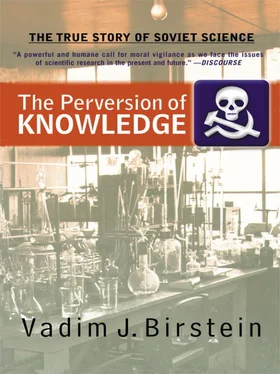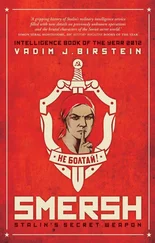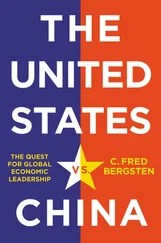Naturally, Lebedev’s role in the Nereis saga and in the story of Lysenko’s portrait and his lectures on “creative Darwinism” were not mentioned in his obituary, which presented him only as a prominent ichthyologist. 369
The so-called cruzin, or KR, case was one of the most famous in the history of Soviet biology and medicine of the late 1940s. Academician Vasilii Parin (1903–1971), a well-known physiologist, was tried in 1948 as a “traitor” and condemned to twenty-five years’ imprisonment as an “American spy” (Document 23, Appendix II). 370He was found guilty of giving a copy of a manuscript of a book about a new anti-cancer preparation, cruzin , written by two Moscow researchers, Professors Grigory Roskin and Nina Klyueva, to American colleagues. Roskin (1892–1964) was a prominent protozoologist and cytologist, a pupil of Nikolai Koltsov. From 1930, he headed the Department of Histology and Embryology at Moscow State University. 371Beginning in 1927, he studied the difference between malignant and normal cells, and in 1931, his research focused on the anti-cancer effect of the parasitic protozoan Trypanozoma cruzi . Together with his wife, the microbiologist Klyueva (1898–1971) of the Institute of Epidemiology, Microbiology, and Contagious Diseases within the Medical Academy, Dr. Roskin developed a method of extraction of the anti-cancer substance from this parasite. Evidently, a specific surface membrane glycoprotein of Trypanozoma acts as a tumor suppressor. 372
At first the substance was named KR, and then cruzin . “‘K’ and ‘R’ turned out to be wife and husband, charming, modest, and obviously devoted to each other and to their work,” wrote American ambassador Walter Bedell Smith in his memoirs about meeting the scientists at Klyueva’s institute on June 20, 1946. 373The book, titled The Biotherapy of Malignant Tumors , which summarized the results of fifteen years of experiments with cruzin , was published in Russian in 1946. 374Its second edition was translated into English and published in England only in 1963. 375In 1946, Roskin and Klyueva’s research was approved and supported by the highest level of the Soviet state, the Politburo members. 376 The Biotherapy of Malignant Tumors had already been in print when Professor Parin, at the time secretary academician of the Medical Academy, gave the manuscript to American colleagues during his visit to the United States in 1947.
Dr. Parin started his career in physiology at Kazan University (1925–1928), then continued his work at Perm University (1928–1932). From 1933–1940, he headed the Department of Normal Physiology at the Sverdlovsk (now Ekaterinburg) Medical Institute and in 1940 was promoted to director there. 377In 1941, the thirty-eight-year-old Parin was appointed director of the First Moscow Medical Institute and then, in 1942, became deputy USSR commissar (minister) of health in charge of science. Professor Parin was the main organizer of the Medical Academy, which was created on December 20, 1944, mainly to oppose VIEM. 378Mairanovsky’s supporters, the academicians Speransky and Grashchenkov (VIEM director), were against establishing this new academy. Parin alone wrote a draft of the structure of the academy and its institutions. Nikolai Burdenko (1876–1946) was appointed president (1944–1946), and Parin was to be secretary academician of the new academy.
The cruzin case attracted Stalin’s personal attention. He ordered the creation of a special commission of the Politburo, and Beria and Andrei Zhdanov were appointed the heads. On January 28, 1947, Zhdanov summoned Klyueva to the Kremlin for an interrogation. He was especially interested in “how it could happen that they [Klyueva and Roskin] were unable to maintain priority in the hands of Soviet scientists and [that] the secret of producing the preparation became known to the Americans.” 379Also, Zhdanov asked Klyueva about the visit of Ambassador Smith to her laboratory. On February 17, 1947, Parin, Roskin, and Klyueva were ordered to come to the Kremlin to attend a meeting of the commission. As Roskin recalled later, the meeting took place in a highly charged atmosphere. 380They were kept waiting for a long time, and the tension and nervousness were extreme when Stalin finally appeared and started to walk back and forth in the room. It was clear that Stalin had studied the book by Roskin and Klyueva attentively. When he addressed the audience, he read the detailed notes that he had made in the margins of the book.
During the meeting, members of the Politburo commission reported that Academician Parin had proven that he had had permission from Minister of Health Georgii Miterev to publish Roskin and Klyueva’s papers in American scientific journals, but Minister Miterev stated that he had not given such permission. 381Miterev burst into tears and said that he was not guilty of anything. However, Stalin’s words were decisive. He said: “I do not trust him [i.e., Prof. Parin].” 382The fate of Professor Parin was determined, and he was arrested. Minister Miterev was replaced by Efim Smirnov.
Following Stalin’s recommendations, Roskin and Klyueva were not arrested but officially named as “traitors,” “anti-patriots,” and so on in the press and at Communist Party meetings. 383This was easy to do in 1947, due to the fact that Professor Roskin was a Jew, and the anti-Semitic campaign in the USSR against the “cosmopolitans” was underway. Roskin and Klyueva were tried by a Court of Honor on June 5, 1947, in the overcrowded club hall of the Council of Ministers. 384The main Party ideologist, Politburo member, and Central Committee secretary Andrei Zhdanov personally wrote the scenario of the court trial and the text of the speech of the public prosecutor. 385Zhdanov also directed the rehearsals of the trial.
From June 5–7, 1947, the open sessions of the court took place at the Variety Theater in Moscow. 386Thousands of specially selected spectators came to watch the show. During the first day, Roskin and Klyueva were publicly interrogated. The second day was devoted to the testimonies of the “witnesses,” members of the court, and representatives of the audience. On the third day, the public prosecutor presented his accusation. Roskin and Klyueva were announced to have been guilty of “anti-patriotic behavior,” “treason against the Motherland,” and they were publicly reprimanded.
The detailed transcripts of all speeches were sent to the Politburo every day. Members of the Politburo attentively followed the first trial of the Court of Honor. Professor Nikolai Blokhin, who later became president of the Medical Academy and supported Mairanovsky, played an active role in the persecution of the two scientists. Academicians Boris Zbarsky and Ivan Strashun were among those who, during the second day of the trial, especially attacked the two “murderers in white coats,” 387as Roskin and Klyueva were called, for treason against the Motherland. Zbarsky finished his speech by saying: “Clean yourselves of the disgrace and shame that you have inflicted upon yourselves by your unworthy deeds—you have never been patriots.” 388This detestable speech did not save Zbarsky from his fate: Five years after this incident, he was arrested as a Jewish member of the “Doctors’ Plot.”
Surprisingly, Roskin and Klyueva were not arrested. Moreover, a month later, on July 12, 1947, the Soviet Council of Ministers ordered all ministries involved in the cruzin project “to help Professor Klyueva with materials and equipment to build her laboratory.” 389Evidently, the whole show was organized to frighten the intelligentsia, especially scientists.
On June 17, the Central Committee of the Party issued a secret letter, “On the Case of Professors Klyueva and Roskin,” to the Party organizations of all the country’s institutions. It started the propaganda campaign against the “anti-patriots fawning before the West,” which from the beginning had a clear anti-Semitic character. Before being arrested, Parin was named as a spy over 100 times during the same procedure of the Court of Honor by a chairman of this court, Professor A. Shabanov. 390In the middle of July, the Central Committee ordered a halt to publishing the English translation of such Soviet scientific journals as Journal of Physics and Acta Physica-Chemica , and even the translated contents of the Russian versions of the journals and abstracts of the articles. 391
Читать дальше











